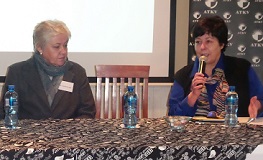Afrikaans language symposium discusses language and heritage
Melissa Javan
5 July 2016
Leaving behind a language that we can be proud of should be our aim explained
Professor Wannie Carstens of the North-West University. Speaking to an audience of
academics and media at the recent Afrikaans Language Heritage Symposium, held
on Thursday 30 June, he explained the history of a uniquely African language. Since
1925, when it was officially recognized as a distinctive language, it has been
considered either the language of oppression or expression.
Afrikaans' language estate
Afrikaans, he went on further, has been influenced by French, slaves in Africa,
the Khoi, Danes and Germans. Today it remains a language that is changed by its
multitudes of speakers.
He cautioned however that Afrikaans speakers need to document their language
more exhaustively and embrace the regional differences in the language. "I am
especially interested in what the Coloured community will leave behind for their
heirs," he
challenged.
Magdaleen Kruger, station manager of Afrikaans station Radio Sonder Grense,
believes that the culture and heritage of Afrikaans is poorly represented, especially
on radio. Listeners, she explained, were part of the problem. They demanded a
purity of language that did not serve the medium well and restricted new voices. A
more dynamic 'living' Afrikaans was especially affected. "The biggest challenge is
the older listeners and language caretakers. People shouldn't be so critical (of the
form of the language used on radio.) Radio is not there to teach children linguistics.
It is there to share information, to empower and to entertain you."
Unfortunately, Kruger added, RSG finds it difficult to reflect the way Afrikaans
is spoken, and lived, for many of its listeners. This is unfortunate she added
because radio is the best platform to share and record the ‘sound’ of Afrikaans.
Speakers addressing vast range of topics
Dr Willa
Boesak, chairman of the Western Cape Culture Commission, spoke
about the Khoi-San's influence on Afrikaans language and culture. He acknowledged
that Afrikaans, the language and culture, was owned by many different South
African cultures. The misconception that it was a language of white people had left
the language covered by a "Storm cloud".
For composer and musician Leslie Javan, Afrikaans was a rich language that
lent itself to storytelling. "Musicians like Koos Kombuis, Jakobus Cloete and Anton
Goosen are good in what they do, because they tell stories instead of just putting
together some lyrics."
Afrikaans, Javan explained, was a descriptive and earthy language that allowed
stories to be passed from one generation to the next in a colourful and attention
grabbing way.
Referring to his own hit song
Met Jou Aan My Sy (With you by my
side), he said it showed how optimistic and progressive the language is. "The song's
lyrics say despite
the hardships of the nation, the narrator is positive, because he
has a song in his heart. He has a song in his heart, because he is in love and he has
his queen by his side."
Jacqueline Setai, senior executive producer for the VIA channel of Media24,
spoke of the role of media in the conservation of the Afrikaans language. She
mentioned that social media memes have proved to be an incredibly powerful tool
for Afrikaans language warriors. "The meme plays a big role in the conservation of
Afrikaans. It gives information without preaching to a person. It has great value."
Other speakers included Pieter du Toit of online news portal Netwerk24.
SouthAfrica.info reporter
 The Afrikaans Language and Culture Association held a symposium where speakers like Cecilia Kruger (left) of the Heritage Foundation and Magdaleen Kruger of Radio RSG spoke about how the language can be uplifted and kept for future generations. (Image: Melissa Javan)
The Afrikaans Language and Culture Association held a symposium where speakers like Cecilia Kruger (left) of the Heritage Foundation and Magdaleen Kruger of Radio RSG spoke about how the language can be uplifted and kept for future generations. (Image: Melissa Javan)
 SA's National Anthem - Pulling together two anthems, five languages - and over 44 million people. South Africans, take ownership of your song!
SA's National Anthem - Pulling together two anthems, five languages - and over 44 million people. South Africans, take ownership of your song! 
 SA's National Orders - Reflecting the inclusiveness and diversity of the new SA, our peoples and our place in the African continent.
SA's National Orders - Reflecting the inclusiveness and diversity of the new SA, our peoples and our place in the African continent. 
 Mapping new views of Africa
The Parliamentary Millennium Project contrasts Western, Eastern and African forms of mapping to shed new light on 'the dark continent'.
Mapping new views of Africa
The Parliamentary Millennium Project contrasts Western, Eastern and African forms of mapping to shed new light on 'the dark continent'. 
 Humankind's cradle - The world's richest hominid site, home to 40% of all human ancestor fossils.
Humankind's cradle - The world's richest hominid site, home to 40% of all human ancestor fossils.  A short history of South Africa
Take a brief tour through our dramatic history: from the earliest inhabitants through colonisation to the discovery of gold and the war that followed; from the evolution of black resistance through three decades of crisis to the eventual death of apartheid.
A short history of South Africa
Take a brief tour through our dramatic history: from the earliest inhabitants through colonisation to the discovery of gold and the war that followed; from the evolution of black resistance through three decades of crisis to the eventual death of apartheid. 



